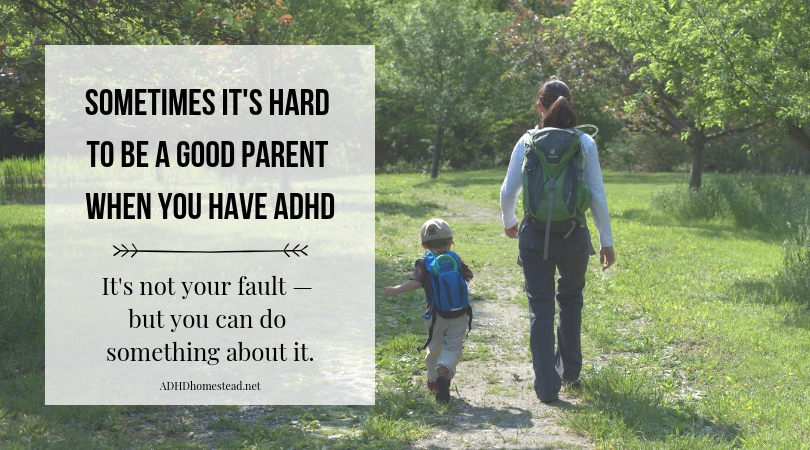The internet is full of advice for parenting kids with ADHD. Too few people discuss the painful inverse: our own ADHD can make effective parenting a huge challenge.
I want to be consistent and level-headed with my kid. Unfortunately, ADHD works directly against me on both fronts. I have a terrible memory. I forget what I asked my son to do ten minutes ago, let alone the consequence I promised if he didn’t do it. Kids are also frustrating. Sometimes intentionally so. ADHDers’ impulsive reactions can get the best of us.
Time perception issues (also called time blindness) add an extra layer to these struggles because I don’t put them in perspective. Whatever kind of day — or hour — we’re having feels like the kind of life we’re having.
None of this is fair. Sometimes I wonder how I’m supposed to teach my kid self-control when I’m still working on those same skills myself.
But I don’t use my ADHD as an excuse. I won’t throw up my hands and tell myself I can’t give my kid what he needs. As Liz Lewis from Healthy ADHD so aptly points out, we have an obligation to show up for people, ADHD or no. My ADHD isn’t going anywhere, but neither is my responsibility to my son.
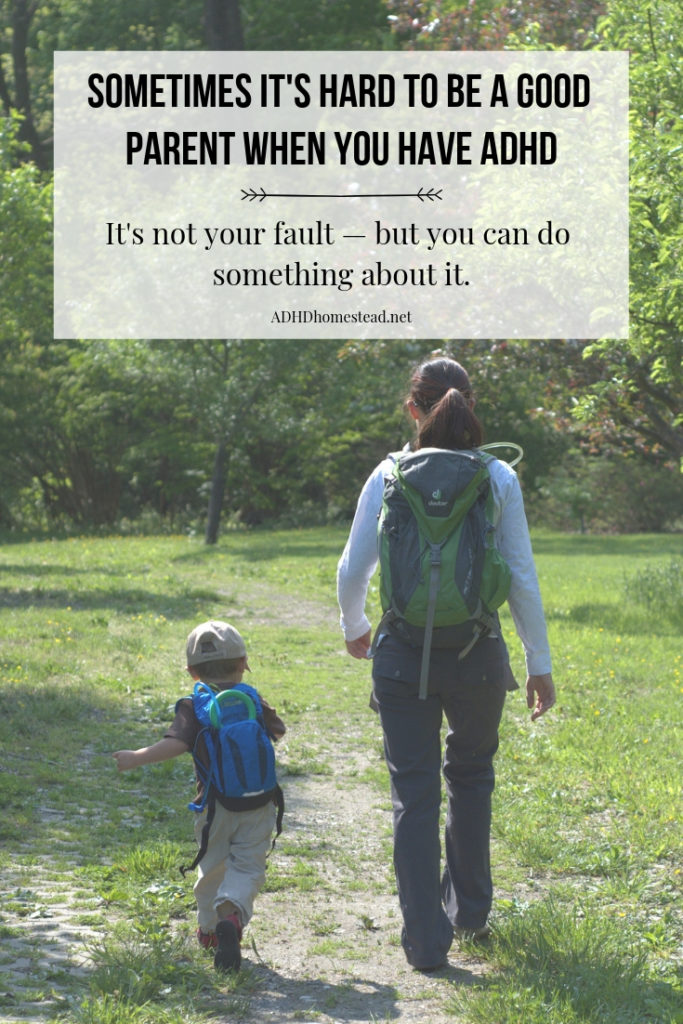
As always, I work with (not against) my brain.
I talk a lot in my book Order from Chaos about getting to know ourselves and our brains. This means accepting our reality — including the reality of our impairments — and finding a way to work within it. The world won’t change for us, but neither can we change who we are.
As a parent, I need to circumvent as many ADHD foibles as possible. Eliminate common points of failure. If I give a long-term or distant consequence, I’ll most likely forget or lose interest.
I also need to get control of problem situations before I get too angry or frustrated. Once I tip into reactive mode, that split-second delay between my feelings and my words disappears. And then I lose control — of my kid’s behavior and my own. When I start in on the lectures and the disproportionate consequences, I damage my relationship with my son. The problem behavior also tends to get worse.
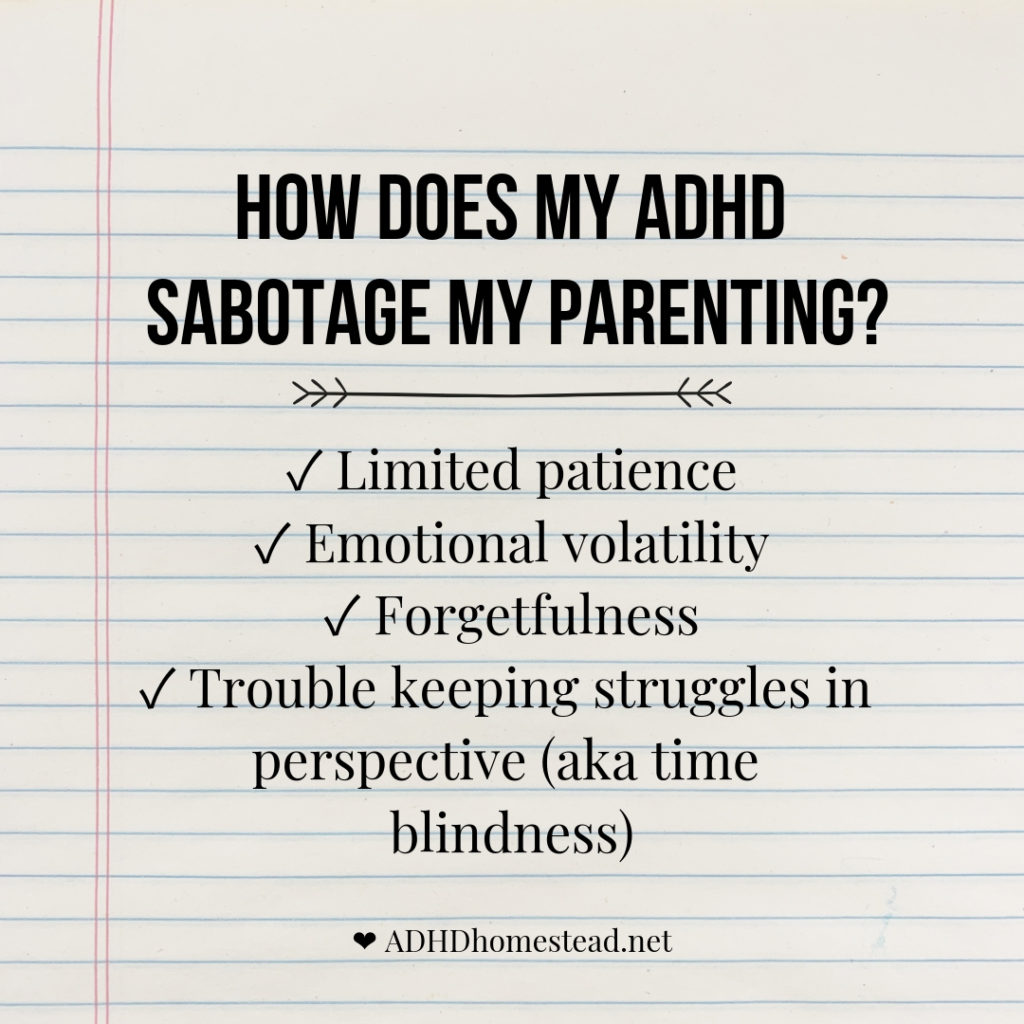
My disciplinary strategy boils down to this: I keep my responses fair, specific, and self-contained. I’m kind but also firm. And I try to keep my parenting in scope of my attention span. (This also helps him. Most young children’s attention spans don’t exceed mine anyway.)
Perhaps most important, I avoid giving my kiddo a bunch of warnings before a consequence. Most warnings only teach children how much time they have before they really need to listen. Warnings also create space for my frustration to mount. No warning is worth triggering an angry lecture.
We need to back off from the lectures and labels.
I got a lot of lectures as a kid. If you have ADHD I bet you did, too. They usually included labels and descriptions of my behavior in general. I didn’t think before I spoke. I was inconsiderate. I gave bullies too much of a reaction. That sort of thing. In other words, when I made mistakes — which I did often — my parents focused on traits. This made sense because my problem behaviors weren’t one-off things. They were patterns that repeated over and over again.
The problem with talking in labels and traits is we can’t change who we are. Even as adults, if someone tells us we “need to show more initiative” or “should learn how to work better on a team,” we get overwhelmed. These criticisms get at the core of who we are. We start to think we simply aren’t good enough.
This leads to what’s called a fixed mindset. We assume we naturally excel at some things and not at others. In elementary school, my hand would shoot up immediately when a teacher introduced a group assignment. I’d ask, “Can we work alone?” I didn’t get along well with others and I thought I never would. So why bother trying?
But we want our kids to try. We don’t want them to think of themselves as annoying or always running late or bad at sharing. Because then they won’t challenge themselves to do better.
In other words, we want them to have a growth mindset: one that views mistakes as an opportunity to learn. One that embraces challenges instead of shying away from them. One that believes they can master any skill with determination and practice. This includes the social and life skills that will make them productive members of our household — skills we ourselves may still struggle with.
The inductive discipline script was a game-changer for me.
The script below comes from a lesson on inductive discipline I attended with the Mariposa Child Success Programs in Baltimore. It also adheres to core concepts from several of my favorite parenting and communication books. If you’d like to build up a strong foundation, I highly recommend Vicki Hoefle’s Duct Tape Parenting and Straight Talk on Parenting, Adele Faber and Elaine Mazlish’s How to Talk So Kids Will Listen and Listen So Kids Will Talk, and Mark Goulston’s Just Listen.
A quick note on when to use discipline:
These books give a lot of background on how to practice empathy and help people of all ages feel heard and understood. They aren’t intended to teach you how to get others to do what you want. Vicki Hoefle in particular focuses a lot on the parent-child relationship. She emphasizes that children most often misbehave when they feel discouraged. A strong connection with our kids decreases the need for us to use any kind of discipline.
But sometimes nobody has time to talk it out. Sometimes it’s not appropriate to talk it out. If my son has deliberately defied me, if he’s going to be late for school, if he just hit another child, or if I’m about to lose my temper with him, we’re not in a place to talk.In Just Listen, Goulston explains that when we’re upset, we literally cannot access the rational part of our brains. Remember this. If you or your child have lost control of your emotions, you can’t have a reasonable conversation. You can’t talk it out. You are literally incapable of empathizing and hearing each other the way you need to. In other words, sometimes we need a disciplinary approach to help everyone regain control of the situation.
Keep it simple and stick to the script.
Discipline needs to stay simple and concise. At its best, it strips away opportunities for me to argue, lecture, nag, or lose my temper. I recommend sticking to this script:
- Name the behavior. Don’t judge, don’t freak out, just state the problem clearly and simply.
I asked you to turn off Minecraft five minutes ago so we could leave. You’re still playing. - Pause. Take a deep breath. Put your hand over your mouth if you need to. But if the behavior doesn’t change, tell the kid exactly what you want them to do (as opposed to not do).
I want you to save and quit now and get your shoes on. - Pause again! I know it’s hard. Nothing is more difficult for a parent with ADHD than controlling our own behavior when our kids frustrate us. But kids need that chance — that choice — to change course. It’s how they learn self-control. My almost-six-year-old will often correct his behavior after Step 1 or 2. But sometimes he doesn’t, and that’s when I need to provide the consequence.
If you don’t save and quit the game, I’m going to turn it off for you. - I know, I know. Now you have to take another breath. Just one. Have they heard you and still not complied? Quickly and calmly implement the consequence.
[Turn off the power to the game system.]
Source: Mariposa Child Success Programs
The key here is calm. Remember to be firm but kind. No ranting, no raving, no labeling. Telling a child they are selfish or rude or don’t listen will only overwhelm them. Eventually, they’ll believe your labels and give you what you expect. When you make the problem as simple, small, and specific as possible — and tell them exactly what you want them to do — you give them a problem they feel empowered to solve.
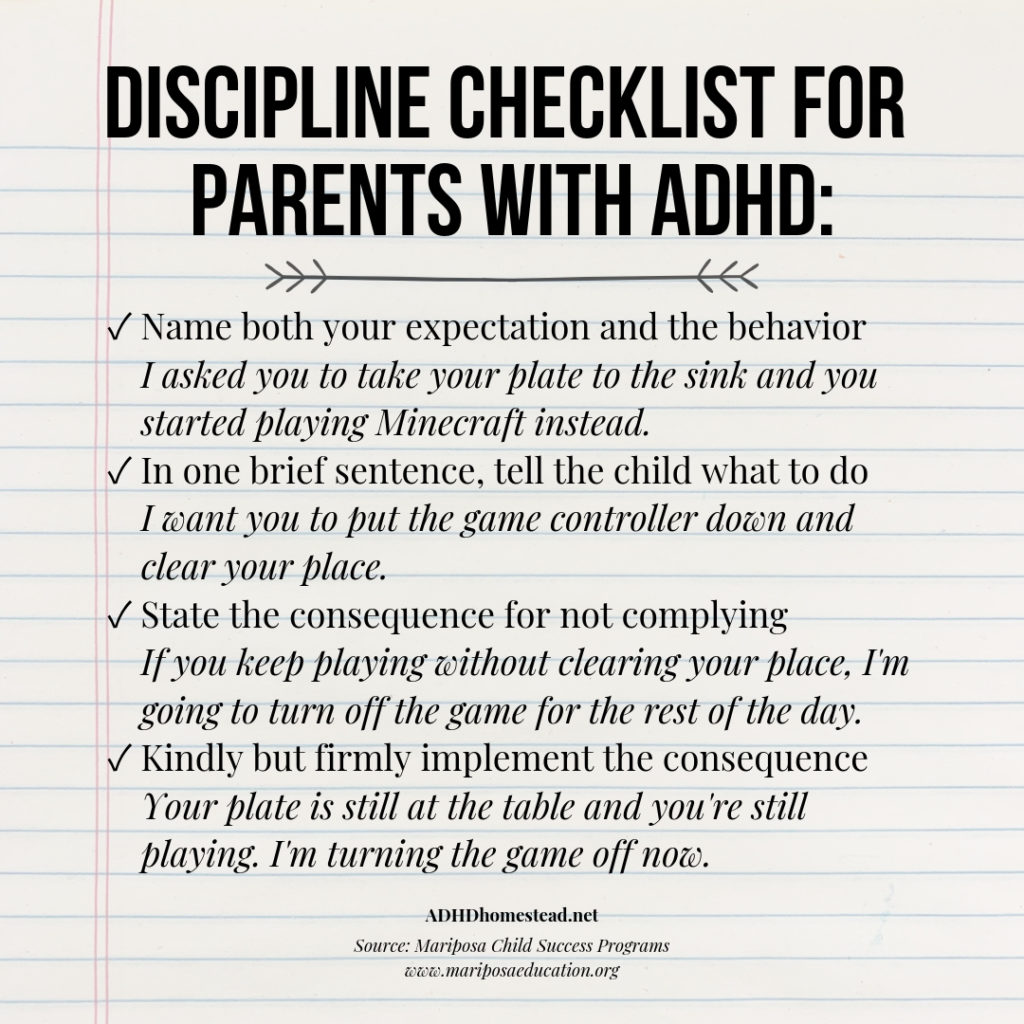
You don’t have to be totally unflappable or perfect.
I want to be clear: I don’t always monitor my tone with my kiddo. If I’ve gotten to the point where I need to implement discipline, I’m often kind of mad at him. Like I said before, this isn’t the time to empathize with his view of things.
Inductive discipline gets my point across better than if I let my knee-jerk reaction take over. And yet it doesn’t ask that I shelter him from my irritation or let him walk all over me. It creates a safe space for him to receive my feelings and choose what to do next. And that choice feels very clear because I’ve given him a concrete instruction.
This skill — stop, think about our behavior, and exercise appropriate self-control — is so difficult for people with ADHD. For folks with unmanaged ADHD symptoms, it may even be impossible. That’s why I appreciate having a script to help me teach it to my son.
Self-control requires practice, and that may mean you need extra support.
I want to be very careful about offering parenting advice for families with ADHD. Kids and adults with ADHD should learn and practice effective communication skills. And these are skills (not traits). They don’t come naturally to many people with ADHD. Most of us need a lot of education, practice, and compassion.
However, ADHD itself cannot be treated with skills practice. It’s a neurobiological disorder that impairs our emotional regulation and self-control. Poorly-managed ADHD makes all these skills more difficult — if not impossible — to learn and practice effectively.
I could not be the parent I want to be without proper ADHD treatment. For me that means structure, medication, diet, exercise, and healthy sleep habits. Others might choose a different combination or add therapy, coaching, or support groups.
The entire package is important, but medication was a total life-changer for me. It allowed me to get my foot in the door with these relationship skills.
And while I’m not in a position to give anyone medical advice, I will always be very open about my own experience with medication. It’s important to know what ADHD is, how it affects our brains, and why medication can be so effective for so many people.
However you choose to coexist with your ADHD, know that it will make or break any successful parenting strategy. If we don’t intentionally manage our ADHD, we can’t intentionally manage our relationship with our kids. They need a safe environment to practice and learn skills like self-control, empathy, communication, and compromise. They can’t do that with an unpredictable or volatile parent, and they can’t do it without someone modeling the skills for them.
Of course we all mess up sometimes — maybe even most of the time — but I do the very best I know how. I feel like I owe my kid that much. Between working on myself and my ADHD and educating myself on effective parenting and communication, I hope it’s enough. I believe it’s enough. Children know when we’re doing our best, even if we don’t get it right every time.
Editor’s note: this post was updated to include audio narration and minor style edits on March 23, 2022.
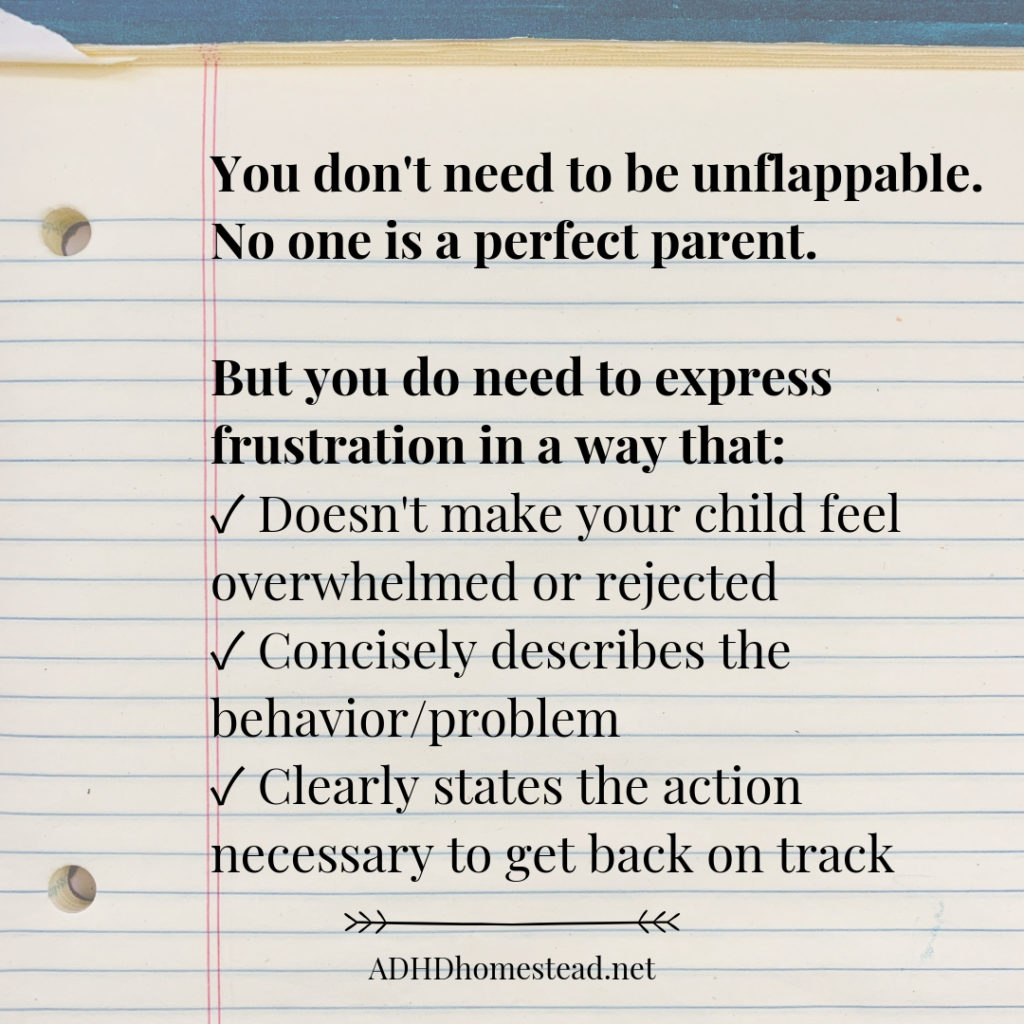
Hey there! Are you enjoying The ADHD Homestead?
Here's the thing: I don't like ads. I don't want to sell your attention to an advertising service run by the world's biggest data mining company. I also value my integrity and my readers' trust above all, which means I accept very few sponsorships/partnerships.
So I'm asking for your support directly. For the cost of one cup of coffee, you can help keep this site unbiased and ad-free.
Below you will find two buttons. The first lets you join our crew of Patreon pals and pledge monthly support for my work. Patrons also have access to my Audioblogs podcast. The second takes you to a simple donation page to pledge one-time or recurring support for The ADHD Homestead, no frills, no strings. Do whichever feels best for you!

